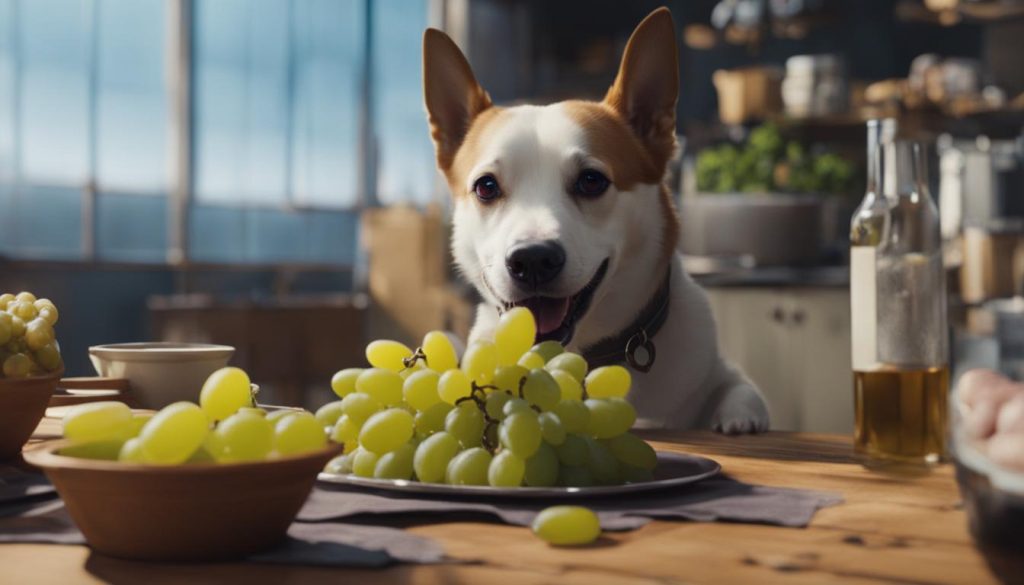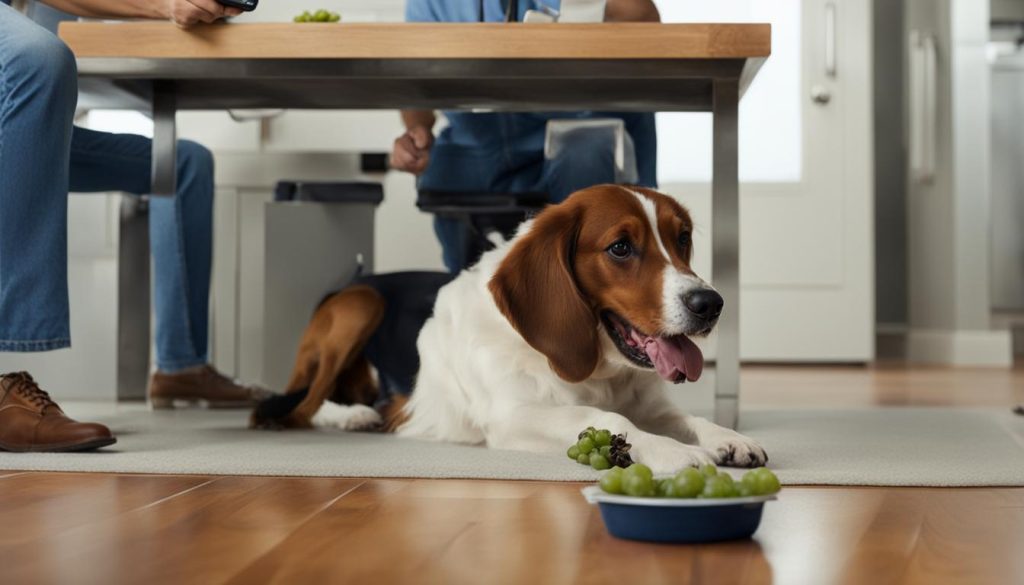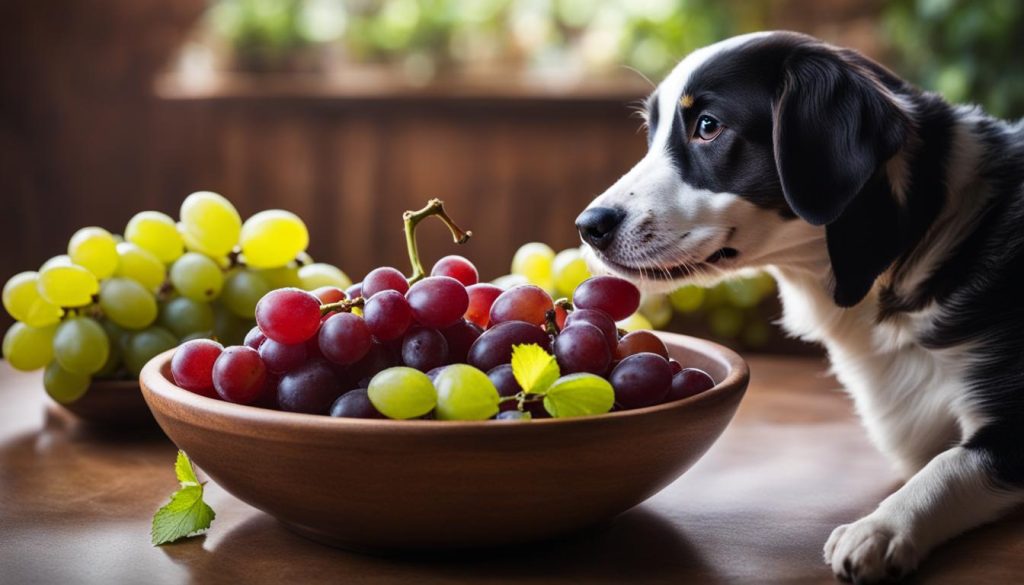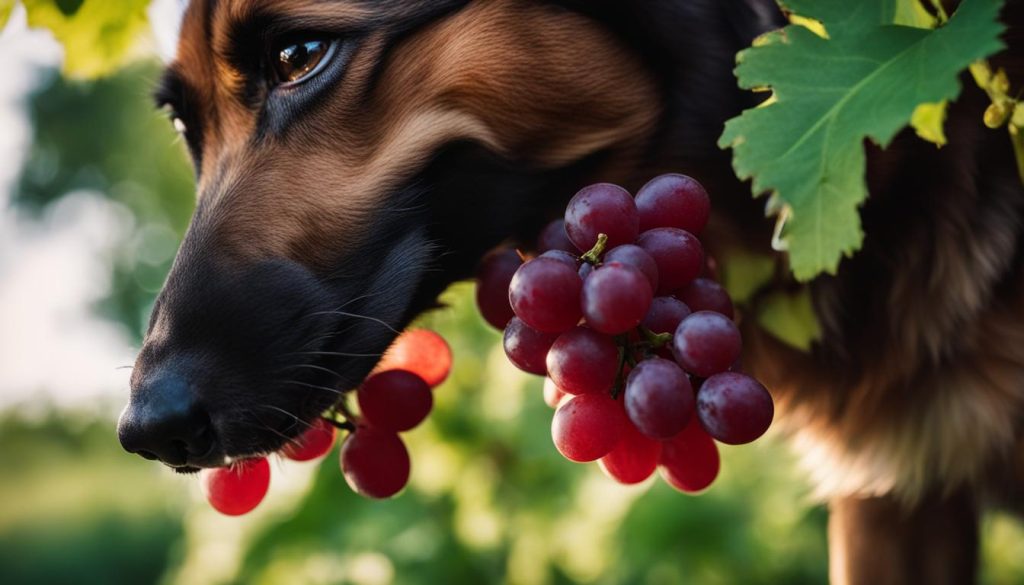Grapes, raisins, and currants can be highly toxic to dogs, potentially causing kidney failure and other severe health issues. It’s important to understand the dangers of grape ingestion in dogs and take preventive measures to keep your furry friend safe.
The exact toxic component in grapes is still unknown, but it affects dogs of all sizes and breeds. Whether fresh, dried, seedless, organic, or non-organic, any type of grape can be toxic to dogs. The toxic dose varies, with some dogs being more sensitive than others.
If your dog ingests grapes or raisins, it is crucial to contact a veterinarian or pet poison control immediately. Symptoms of grape poisoning may include vomiting, lack of appetite, lethargy, diarrhea, excessive thirst, and excessive urination.
Treatment for grape ingestion involves inducing vomiting, administering activated charcoal, and providing intravenous fluids to support kidney function. The prognosis depends on factors such as the amount ingested, timing of treatment, and the dog’s response to therapy.
To prevent grape toxicity in dogs, ensure that grapes and raisins are kept out of reach of pets. Avoid sharing any grape-containing foods with your dog and educate family members and visitors about the risks.
Key Takeaways:
- Grapes, raisins, and currants can be toxic to dogs, causing kidney failure.
- All types of grapes, whether fresh or dried, seedless or seeded, organic or non-organic, can be harmful to dogs.
- If your dog ingests grapes or raisins, contact a veterinarian immediately for proper treatment.
- Preventive measures include keeping grapes and raisins out of reach and avoiding sharing grape-containing foods with your dog.
- Prompt veterinary intervention is crucial for the best prognosis and recovery.
Types of Grapes and Raisins Toxic to Dogs

When it comes to grapes and raisins, it’s important for dog owners to be aware of the specific types that can be toxic to their furry friends. Dogs can be poisoned by a variety of grape and raisin types, including seedless and seeded varieties, whether they are commercial or homegrown. Both red and green grapes/raisins can pose a risk to dogs, regardless of whether they are organic or non-organic. It’s crucial to note that grape pressings from wineries can also be toxic to dogs, so it’s essential to keep them out of reach.
Table: Types of Toxic Grapes and Raisins for Dogs
| Grape/Raisin Type | Toxicity Level |
|---|---|
| Seedless or seeded varieties | Toxic |
| Commercial or homegrown | Toxic |
| Red or green grapes/raisins | Toxic |
| Organic or non-organic | Toxic |
| Grape pressings from wineries | Toxic |
Grape jellies, grape juice, and wine, on the other hand, do not appear to cause toxicity in dogs. While the exact toxic component in grapes and raisins is unknown, it’s crucial to remember that any exposure to these fruits should be a cause for concern due to their potential toxicity to dogs. To ensure your pet’s safety, always keep grapes and raisins out of reach and avoid sharing grape-containing foods with your canine companion.
Toxicity Concern and Dose for Dogs
When it comes to grape ingestion in dogs, there is no established toxic dose. While some dogs may consume large quantities of grapes without adverse effects, others may experience poisoning even after ingesting just a few grapes or raisins. The sensitivity to grape ingestion can vary among individual dogs, making it difficult to predict the level of toxicity.
It is crucial to remember that any exposure to grapes or raisins should be a cause for concern due to the unknown toxicity. Therefore, it is always best to err on the side of caution and seek immediate veterinary attention if you suspect your dog has ingested these fruits.
By understanding the potential risks and sensitivity to grape ingestion in dogs, pet owners can take proactive steps to prevent exposure and ensure the well-being of their furry companions.
The Reasons behind Grape Toxicity in Dogs

Grape toxicity in dogs is a serious concern, but the exact reason behind it remains unknown. Several theories have been proposed to explain why grapes can be toxic to dogs, but no specific toxic agent has been definitively identified. To better understand the potential reasons for grape toxicity, let’s explore some of the leading theories:
- Mycotoxin: One theory suggests that a mycotoxin, which is a toxic substance produced by fungi, could be responsible for the toxicity in grapes. However, further research is needed to determine the presence and effects of specific mycotoxins in grapes.
- Salicylate: Another theory suggests that grapes may contain a salicylate compound, similar to aspirin, that could be toxic to dogs. Salicylates are known to have harmful effects on certain animals, but their role in grape toxicity is still uncertain.
- Tartaric Acid: Tartaric acid has also been considered as a possible cause of grape toxicity in dogs. However, more research is needed to determine the exact mechanism by which tartaric acid might be harmful to dogs.
While these theories provide some insight into the potential reasons for grape toxicity, none of them have been fully proven. The variability in grape toxicity among different dogs and the lack of a clear toxic component make it challenging to pinpoint the exact cause.
“The exact reason behind grape toxicity in dogs is currently unknown. There are theories that suggest it could be due to a mycotoxin or a salicylate (aspirin-like) drug present in grapes. Tartaric acid has also been considered as a possible cause. However, no specific toxic agent has been definitively identified.” – Veterinary Toxicologist
Despite the uncertainties surrounding grape toxicity in dogs, it is essential for pet owners to remain vigilant and take preventive measures. Avoiding grape ingestion and promptly seeking veterinary care if ingestion occurs are the best approaches to protect your furry friend from potential harm.
| Theories | Status |
|---|---|
| Mycotoxin | Unproven |
| Salicylate | Unproven |
| Tartaric Acid | Unproven |
Immediate Steps to Take If Your Dog Eats Grapes or Raisins

If you suspect that your dog has eaten grapes or raisins, it is crucial to take immediate action to protect their health. Here are the steps you should follow:
- Contact a veterinarian or animal poison control: Reach out to a professional immediately to inform them of the situation. They can provide guidance specific to your dog’s needs and advise on the next steps to take.
- Don’t induce vomiting without professional advice: While inducing vomiting is sometimes recommended in cases of grape or raisin ingestion, it should be done under the supervision of a veterinarian. They will assess the situation and determine if vomiting is necessary for your dog’s safety.
- Administer activated charcoal if instructed: Activated charcoal can help prevent the absorption of toxins from grapes or raisins in your dog’s system. However, it should only be given under the guidance of a professional.
- Prepare for emergency veterinary care: If your veterinarian advises it, be ready to bring your dog to an emergency veterinary clinic. They may need to provide further treatment, including intravenous fluids and monitoring for potential kidney damage.
Remember, time is of the essence when dealing with grape or raisin ingestion in dogs. Acting promptly and seeking professional help can greatly increase your pet’s chances of a positive outcome.
Expert Insight:
“If your dog ingests grapes or raisins, it is crucial to contact a veterinarian or animal poison control right away. These fruits can be highly toxic to dogs and may lead to kidney failure. Your veterinarian will be able to provide the best course of action based on your dog’s individual needs. Never hesitate to seek professional help in these situations.”
By following the immediate steps and seeking professional help, you can take decisive action to safeguard your dog’s well-being in cases of grape or raisin ingestion.
| Signs of Grape Poisoning in Dogs | Immediate Actions |
|---|---|
| Vomiting, lack of appetite, lethargy | Contact veterinarian or animal poison control |
| Excessive thirst, excessive urination | Don’t induce vomiting without professional advice |
| Nausea, abdominal pain | Administer activated charcoal if instructed |
| Breath with an ammonia odor | Prepare for emergency veterinary care |
Symptoms of Grape or Raisin Toxicity in Dogs

Grape or raisin toxicity in dogs can lead to a range of symptoms that can vary in severity. It’s important to be aware of these signs and seek immediate veterinary attention if you suspect your dog has ingested grapes or raisins.
Early symptoms of grape poisoning in dogs may include vomiting, lack of appetite, lethargy, and possibly diarrhea. These initial signs may not seem alarming, but it’s crucial to remember that grape toxicity can progress rapidly and cause serious health complications.
As kidney failure develops, more severe symptoms can arise. These may include nausea, abdominal pain, excessive thirst, excessive urination, and breath with an ammonia odor. If left untreated, grape poisoning can lead to kidney failure, coma, and a poor prognosis.
| Symptoms | Severity |
|---|---|
| Vomiting | Mild to Severe |
| Lack of Appetite | Mild |
| Lethargy | Mild to Severe |
| Diarrhea | Mild |
| Nausea | Moderate to Severe |
| Abdominal Pain | Moderate |
| Excessive Thirst | Moderate to Severe |
| Excessive Urination | Moderate to Severe |
| Ammonia-like Breath | Severe |
Remember, if your dog exhibits any of these symptoms after ingesting grapes or raisins, it is crucial to seek veterinary care immediately. Time is of the essence when it comes to treating grape poisoning and minimizing potential harm to your beloved pet.
Quote:
Early symptoms of grape or raisin toxicity in dogs may be mild and easily overlooked, but it’s important to be vigilant and take prompt action. If you notice any changes in your dog’s behavior or suspect grape ingestion, don’t hesitate to contact a veterinarian for guidance.
Diagnosing and Treating Grape Poisoning in Dogs
Diagnosing grape poisoning in dogs involves a combination of a thorough history of ingestion, physical examination, and diagnostic tests. If you suspect your dog has ingested grapes or raisins, it’s essential to provide your veterinarian with as much information as possible about the quantity and type of grapes consumed. The presence of grape or raisin remnants in the vomit can further confirm the suspicion.
The veterinarian will likely perform a complete blood count (CBC), a serum biochemistry profile, and a urinalysis to assess the extent of kidney damage and overall health status. These tests help evaluate the levels of blood urea nitrogen (BUN), creatinine, and electrolytes, providing valuable insights into kidney function and potential complications.
Once diagnosed, immediate treatment is vital to prevent further absorption of toxins and minimize kidney damage. The first step is often to induce vomiting to remove any remaining grapes from the stomach. Activated charcoal administration helps to bind to the toxins and prevent their absorption in the intestines. Intravenous fluids are then provided to support kidney function, maintain hydration, and flush out any toxins that may have entered the bloodstream.
In addition to these primary treatments, medications may be prescribed to control nausea, maintain blood flow to the kidneys, and regulate blood pressure. The exact treatment plan will depend on the severity of the poisoning and the individual dog’s response. Hospitalization is often necessary to closely monitor the dog’s condition and provide additional supportive care.
| Diagnostic Methods | Treatment Options |
|---|---|
| Thorough history of ingestion | Inducing vomiting to remove the grapes |
| Physical examination | Administering activated charcoal to prevent toxin absorption |
| Complete blood count (CBC) | Providing intravenous fluids to support kidney function |
| Serum biochemistry profile | Medications to control nausea, maintain blood flow to the kidneys, and regulate blood pressure. |
| Urinalysis | Hospitalization for monitoring and supportive care |
The prognosis for dogs with grape poisoning depends on several factors, including the amount ingested, the timing of treatment, and the individual dog’s response. Dogs that receive prompt veterinary care after grape ingestion, especially for smaller quantities, have a higher chance of a positive outcome. However, if kidney damage has already occurred, the prognosis becomes poor, as the kidneys have limited regenerative ability. Timely diagnosis, immediate treatment, and ongoing monitoring are critical for improving the dog’s prognosis and promoting recovery.
Prognosis and Recovery from Grape Poisoning in Dogs
When it comes to grape poisoning in dogs, the prognosis and recovery can vary depending on several factors. These include the amount of grapes ingested, the timing of treatment, the development of kidney failure, and the individual dog’s response to therapy.
Dogs that receive immediate treatment after ingesting a small quantity of grapes or raisins have a higher chance of a positive outcome. The prompt administration of treatments such as inducing vomiting, administering activated charcoal, and providing intravenous fluids can help to block toxin absorption and minimize kidney damage.
However, if the kidneys are already compromised and urine production has decreased, the prognosis is poor. Kidneys have limited regenerative ability, and once damaged, they may not function as well as before. Therefore, timely veterinary intervention is crucial to give dogs the best chance of recovery.
| Factors Affecting Prognosis | Prediction |
|---|---|
| Amount of Grapes Ingested | Higher amounts increase the risk of severe toxicity and kidney damage. |
| Timing of Treatment | Immediate treatment improves the chances of a positive outcome. |
| Development of Kidney Failure | If kidney failure occurs, the prognosis becomes more guarded. |
| Response to Therapy | Some dogs may not respond well to treatment, which can impact their recovery. |
Please be aware that prevention is always better than treatment. Keeping all grapes, raisins, currants, and foods containing these fruits out of your dog’s reach is the best way to prevent grape toxicity. Avoid sharing grape-containing foods with your dog and educate family members and visitors about the risks. By staying vigilant and prioritizing your pet’s safety, you can help ensure a grape-free and healthy environment for your beloved canine companion.
Prevention of Grape Toxicity in Dogs

Preventing grape poisoning in dogs is crucial to safeguard their health and well-being. By following these grape toxicity prevention tips, you can keep your furry friend safe from the potential dangers of grapes and raisins:
- Keep all grapes, raisins, and currants out of your dog’s reach. Store them in secure containers or high cabinets to prevent accidental ingestion.
- Avoid sharing any grape-containing foods with your dog. This includes snacks, desserts, and other dishes that may contain grapes or raisins.
- Educate family members, especially children, and visitors about the risks of grapes and raisins to dogs. Encourage them to also avoid giving grapes or raisins to your dog as treats.
- Consider using grape-like dog-safe alternatives for training treats or rewards, such as small pieces of carrot or blueberries.
- If you have a garden or backyard, be cautious of grapevines or grape plants. Ensure they are inaccessible to your dog. Regularly check for fallen grapes and promptly remove them.
- If you suspect that your dog has ingested grapes or raisins, contact a veterinarian or an animal poison control service immediately. Time is of the essence in preventing further harm to your pet.
By implementing these preventive measures and staying vigilant, you can create a grape-free and safe environment for your beloved dog.
Expert Tip:
“Prevention is the key to protecting your dog from grape toxicity. It’s always better to be safe than sorry. Keep grapes and raisins securely stored and educate everyone in your household about the potential dangers. Remember, even a small amount can have severe consequences for your pet’s health.”
| Type of Prevention | Description |
|---|---|
| Secure Storage | Keep grapes, raisins, and currants out of your dog’s reach by storing them in secure containers or high cabinets. |
| Avoid Sharing | Do not share any grape-containing foods with your dog, including snacks, desserts, and dishes that may contain grapes or raisins. |
| Educate Others | Inform family members and visitors about the risks of grapes and raisins to dogs, and encourage them to avoid giving these fruits to your dog. |
| Use Alternatives | Consider using dog-safe alternatives like small pieces of carrot or blueberries as training treats and rewards. |
| Garden Caution | Be cautious of grapevines or grape plants in your garden or backyard, ensuring they are inaccessible to your dog. Regularly remove fallen grapes. |
| Prompt Action | If your dog ingests grapes or raisins, seek immediate veterinary assistance to prevent further harm. |
Wrapping Up
To summarize, grape toxicity in dogs is a serious and potentially life-threatening condition. The exact toxic component in grapes and raisins is still unknown, making it crucial to avoid exposing dogs to these fruits altogether. Even small amounts can lead to kidney failure, with symptoms including vomiting, lack of appetite, and excessive thirst.
If your dog accidentally ingests grapes or raisins, immediate veterinary intervention is essential. Prompt diagnosis and treatment can minimize the severity of poisoning and improve the chances of a positive outcome. Inducing vomiting, administering activated charcoal, and providing intravenous fluids are common treatment methods to support kidney function.
The best approach, however, is prevention. Keep all grapes, raisins, and foods containing these fruits out of your dog’s reach. Avoid sharing any grape-containing foods and educate your family members and visitors about the risks. By prioritizing your pet’s safety and maintaining a grape-free environment, you can help ensure your dog remains healthy and protected from the dangers of grape toxicity.
FAQ
What are the dangers of a dog eating a grape?
Grapes, raisins, and currants can cause kidney failure in dogs. The exact toxic component is still unknown. Symptoms of grape or raisin toxicity include vomiting, lack of appetite, lethargy, diarrhea, excessive thirst, and excessive urination.
What should I do if my dog eats grapes or raisins?
It is crucial to contact a veterinarian or pet poison control immediately if you suspect your dog has ingested grapes or raisins. Treatment involves inducing vomiting, administering activated charcoal, and providing intravenous fluids to support kidney function.
Are all types of grapes toxic to dogs?
Yes, grapes of any type, whether fresh, dried, seedless, organic, or non-organic, can be toxic to dogs.
What foods can pose a poisoning risk if they contain grapes or raisins?
Foods such as raisin bran cereal, trail mix, granola mix, and baked goods that contain grapes, raisins, or currants can also pose a poisoning risk to dogs.
How much grape or raisin does it take to poison a dog?
The toxic dose of grapes or raisins is variable, with some dogs being more sensitive than others. There is no established toxic dose, and some dogs may experience poisoning even after consuming just a few grapes or raisins.
Why are grapes toxic to dogs?
The exact reason behind grape toxicity in dogs is currently unknown. Theories suggest it could be due to a mycotoxin, a salicylate (aspirin-like) drug, or tartaric acid. However, no specific toxic agent has been definitively identified.
What is the prognosis for dogs with grape or raisin poisoning?
The prognosis depends on factors such as the amount ingested, timing of treatment, and the dog’s response to therapy. Dogs that receive immediate treatment after ingesting a small quantity of grapes or raisins have a higher chance of a positive outcome.
How can I prevent grape toxicity in my dog?
The best way to prevent grape toxicity is to keep grapes, raisins, currants, and foods containing these fruits out of reach of pets. Avoid sharing any grape-containing food with your dog and educate family members and visitors about the risk of grapes and raisins to dogs.






